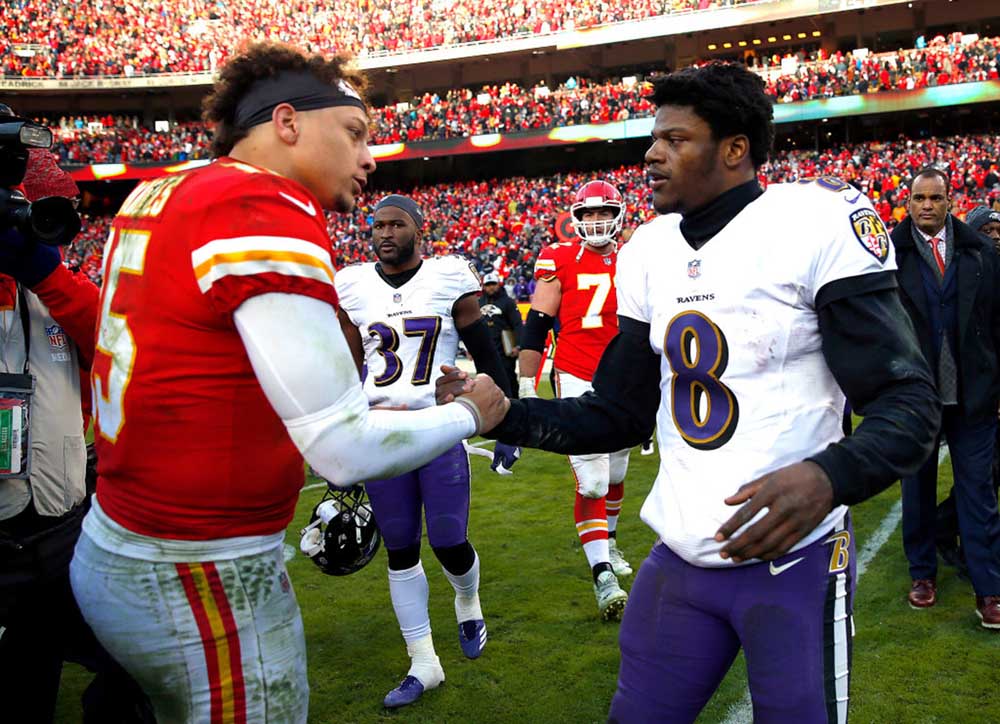How rookie deals of Ravens’ Lamar Jackson, Chiefs’ Patrick Mahomes can help keep teams’ cores together
Published 12:00 am Sunday, September 22, 2019

- Quarterback Patrick Mahomes, left, of the Kansas City Chiefs shakes hands with quarterback Lamar Jackson of the Baltimore Ravens after the Chiefs defeated the Ravens 27-24 in overtime to win the game at Arrowhead Stadium in December 2018 in Kansas City, Missouri. Teams with quarterbacks on rookie contracts are able to add more high-priced players around them. (Jamie Squire/Getty Images/TNS)
It is forever tempting to build a team around a young quarterback, but it is almost never easy. There are developmental hiccups and physical limitations, injuries and inconsistencies. Starting quarterbacks are the Jenga piece that cannot be bungled, and only so many come ready-made. Drew Brees, the NFL’s all-time passing leader, did not make the Pro Bowl until his fourth season.
But if a young quarterback is good enough, if his talents belie his age, there might not be a greater force multiplier in sports.
The biggest threats to the New England Patriots’ dynastic run have been teams with quarterbacks almost half Tom Brady’s age. When Patrick Mahomes and the Kansas City Chiefs faced Brady and the Patriots in last season’s AFC championship game, it was the greatest age difference (18 years, one month) between starting quarterbacks in league playoff history.
Mahomes, 24, is a generational talent, the NFL’s Most Valuable Player in only his second season. But his contract might be as important to Kansas City’s ascent as his glorious right arm. Mahomes is not yet paid like an MVP, and that salary disparity gives the Chiefs flexibility. When the Ravens meet Kansas City on Sunday in a clash of unbeatens, they will battle a Super Bowl favorite led by its 10th-highest-paid player.
Next year, with former quarterback Joe Flacco’s mega-contract off the books, the Ravens will pay their highest-earning quarterback and most important player just $2.6 million. Twenty-six other teams will owe at least one quarterback over $5 million in 2020. What the Ravens do not have to spend on Jackson, they can allocate elsewhere.
“Certainly, it enhances your window from a standpoint that you could become aggressive at other positions,” said ESPN NFL analyst Mike Tannenbaum, the former New York Jets general manager and Miami Dolphins executive vice president of football operations. “It keeps your window open because there’s such a substantial savings, so teams like Kansas City and Baltimore right now can sign other players that, a year or two down the road, they won’t be able to.”
The Chiefs have built smartly, complementing Mahomes with young, cheap playmakers.
But Kansas City also has spent lavishly to patch up its defense and supercharge its offense. In April, the Chiefs traded a 2019 first-round pick and a 2020 second-round pick for Seattle Seahawks star pass rusher Frank Clark. Then they signed him to a five-year, $105.5 million contract.
When the Chiefs signed wide receiver Sammy Watkins to a three-year, $48 million deal in March 2018, it was in large part because they assumed Mahomes “would be an elite-level quarterback,” Kansas City general manager Brett Veach told The Ringer. With Hill and All-Pro tight end Travis Kelce already under contract, they could afford to double down on Mahomes’ potential.
“They put speed around him. They throw shots. They throw screens. They check it down. They run the ball. That’s what they do. They’re not complicated,” Ravens coach John Harbaugh said Wednesday. “You can see what they’re doing, but they do it really well with good players, and they give you all the things that are tough on different coverages.”
The Chiefs were not the first to seize on the value of a capable quarterback on a rookie contract. The Philadelphia Eagles won the Super Bowl two years ago with a second-year quarterback, Carson Wentz, and decently paid backup, Nick Foles. The Los Angeles Rams went to the Super Bowl last season with third-year quarterback Jared Goff.
Rising stars, quarterbacks especially, do not stay cheap for long. Wentz and Goff signed contract extensions before this season worth up to a combined $278 million. Mahomes could be the first player to earn a $200 million contract. But players are not eligible for a contract extension until after their third NFL season.
The Ravens will face difficult personnel decisions after this season.
Jackson’s contract will make it easier to address what Tannenbaum called the “premium positions” — offensive line, cornerback and pass rusher. Pretty soon, Ravens executive vice president/general manager Eric DeCosta will have to worry about paying Jackson, too. Until then, Tannenbaum said, the Ravens can get him the help he needs.
“Make sure that good, young players stay on your team,” he said, “and you can keep your nucleus together.”






